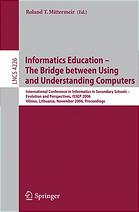

Most ebook files are in PDF format, so you can easily read them using various software such as Foxit Reader or directly on the Google Chrome browser.
Some ebook files are released by publishers in other formats such as .awz, .mobi, .epub, .fb2, etc. You may need to install specific software to read these formats on mobile/PC, such as Calibre.
Please read the tutorial at this link: https://ebookbell.com/faq
We offer FREE conversion to the popular formats you request; however, this may take some time. Therefore, right after payment, please email us, and we will try to provide the service as quickly as possible.
For some exceptional file formats or broken links (if any), please refrain from opening any disputes. Instead, email us first, and we will try to assist within a maximum of 6 hours.
EbookBell Team

4.4
82 reviewsAlthough the school system is subject to specific national regulations, didactical issues warrant discussion on an international level. This applies specifically to informatics didactics. In contrast to most other scientific disciplines, informatics undergoes substantial technical and scientific changes and shifts of paradigms even at the basic level taught in secondary school. Moreover, informatics education is under more stringent observation from parents, potential employers, and policy makers than other disciplines. It is considered to be a modern discipline. Hence, being well-educated in informatics seemingly ensures good job perspectives. Further, policy makers pay attention to informatics education, hoping that a young population well-educated in this modern technology will contribute to the future wealth of the nation. But are such high aspirations justified? What should school aim at in order to live up to such expectations? ISSEP 2005, the 1st International Conference on Informatics in Secondary Schools – Evolution and Perspectives already showed that informatics teachers have to bridge a wide gap [1, 2]. On one hand, they have to show the inherent properties that informatics (or computer science) can contribute to general education. On the other hand, they are to make pupils computer literate. Under the constraint of limited time available for instruction, these different educational aims come into conflict. Computer-supported teaching or eLearning is to be considered distinct from informatics education. However, in many countries, informatics teachers still have to support the eTeaching activities of their colleagues.